#p ovidius naso
Explore tagged Tumblr posts
Text



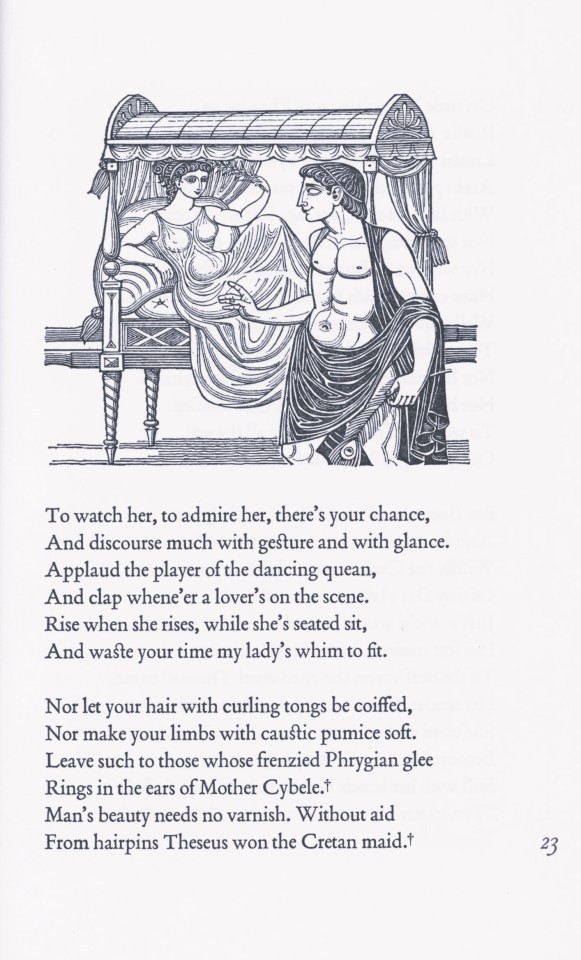
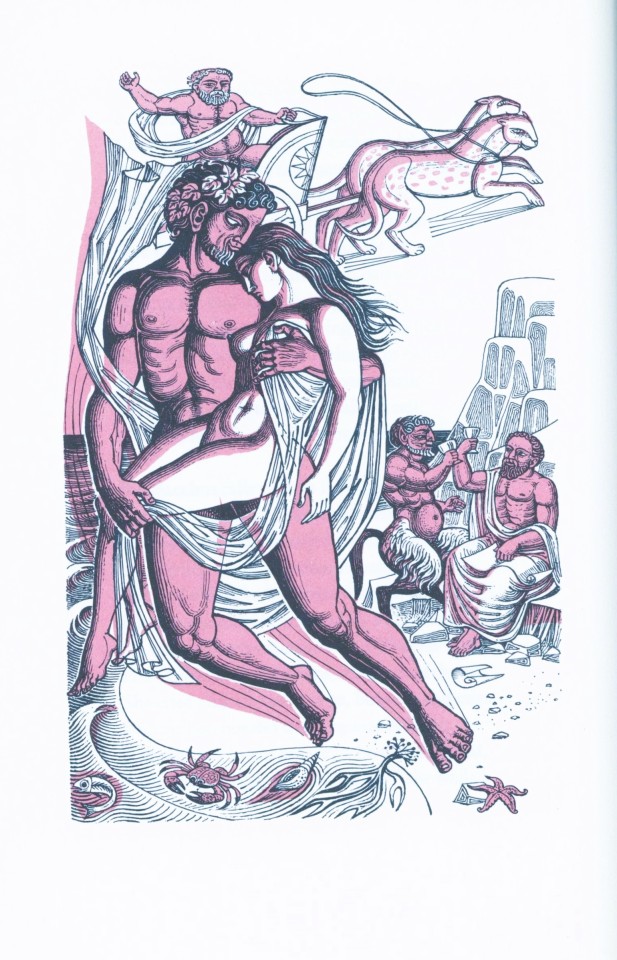

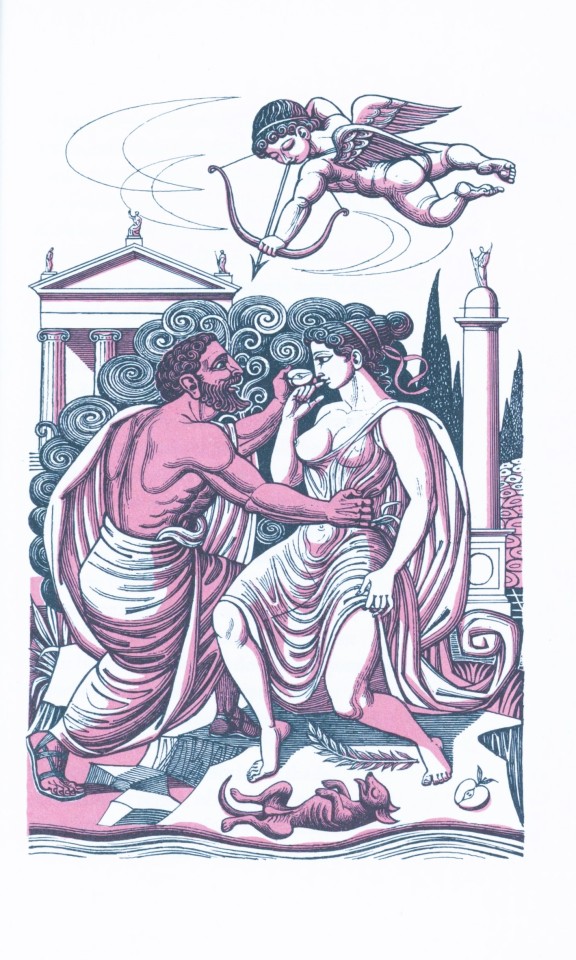


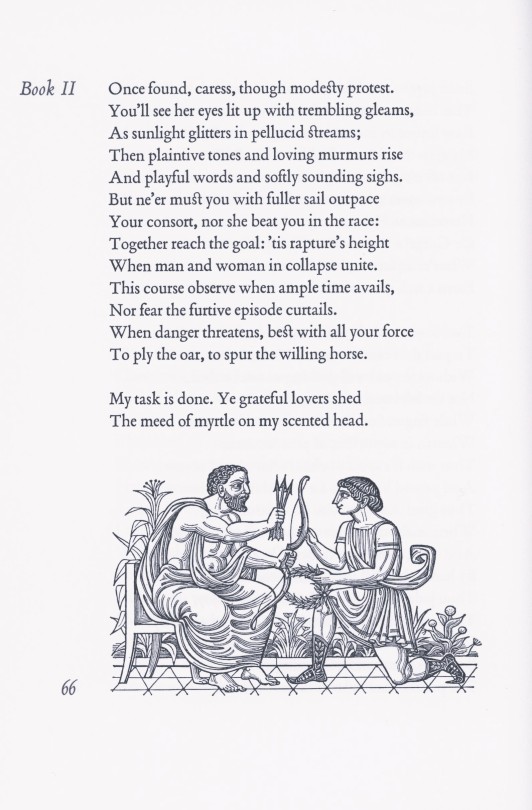

Classic Lessons in Love
Publius Ovidius Naso (43 BC-AD 17/18), more familiarly known as Ovid, was a Roman poet most famously known for his mythological history of the world, Metamorphoses. His satirical and sometimes dark take on all the intricacies of love and relationships is exhibited in Ars Amatoria. The Art of Love is a 1971 English translation edition of Ars Amatoria, translated by English classicist and scholar of Latin poetry B. P. Moore (1877-1955), with pen and ink illustrations by British artist Eric Fraser (1902-1983). The edition was designed by Robert L. Dothard and printed at the Press of A. Colish in Mount Vernon, NY, for members of the Limited Editions Club in an edition of 1500 copies on specially-made, oyster-white, mould-made paper crafted at the Arches mill in France.
In the first book of Ars Amatoria, Ovid guides men on how to successfully find a woman. In the second book, we see Ovid's advice shift towards maintaining a healthy relationship with one's partner. The third and final book, produced two years after the first two, focuses on advice for women on how to win and keep the love of a man. The work, however, was considered salacious and was banned by Emperor Augustus, with the charge of it being immoral, and is one of the few examples of the Roman government censoring a Roman author’s writing.
The topic's typical scenarios are presented engagingly, incorporating elements from Greek mythology, daily life in ancient Rome, and universal human experiences. Ovid offers hilarious advice, such as how women can keep their lovers from becoming neglectful by making them artificially jealous. He also advises men to never argue with their mistresses, as it could lead to expensive gift-giving in order to reconcile. When it comes to the sexes, it seems some things never change!
-Melissa, Special Collections Classics Intern
View other Classics posts.
View more posts from the Limited Editions Club.
#classics#ovid#love#lovers#Ars Amatoria#art of love#poetry#classical literature#roman poetry#greek mythology#ancient rome#relationships#advice#poet#Limited Editions Club#Press of A. Colish#Eric Fraser#B. P. Moore#Robert L. Dothard#fine press books#Melissa
81 notes
·
View notes
Note
Helloo I hope you're doing well :) I was reading about Hector and realised I've never seen him outside of the Iliad. Does he appear in other texts ?
Hello and thank you very much for your sweet words and your ask! Oh yes of course. Hector appears in a plethora of ancient Greek and Roman texts but the real test is to see him outside the context of the Trojan war! Hahaha!
For example Hector appears in plenty of texts by Apollodorous in various contexts and he even mentions how Hector was the one to kill Protesilaus and that is mentioned in several sources more I believe Hyginus included as well as a writer called Philostratus mentions the death of Protesilaus by the hands of Hector. Pausanias mentions Hector in one painting or image sitting in a mourning manner next to the Ethipian king Memnon after the Thracian Thamyris. Plutarch also mentions Hector in various of his texts in the context of Trojan War. Eurypedes mentions Hector in many of his tragedies. Strabo makes mentions to Hector during his geographical expeditions. Plato mentions Hector a lot in his work (even in Apology), Pindar as well as Diodorus Siculus. Last but not least we have Aristotle who mentions Hector in various of his works.
For other roman sources we have of course the Aenead by Virgil and Ovid. Even Pliny the Elder makes mentions to Hector and of course P. Virgilius Maro as he makes commentary on Virgils' Aenead. P. Ovidius Naso also mentions him in his work among other written roman sources including Horace
For his physical description we again have the classic cases of Malalas and Dares the Phrygian. And of course again we have kinda contradictory accounts on him:
Dares the Phrygian: Hector spoke with a slight lisp. His complexion was fair, his hair curly. His eyes would blink attractively. His movements were swift. His face, with its beard, was noble. He was handsome, fierce, and high-spirited, merciful to the citizens, and deserving of love. Malalas: dark-skinned, tall, very stoutly built, strong, good nose, wooly-haired, good beard, squinting, speech defect, noble, fearsome warrior, deep-voiced.
To name a few writers who mention him! Happy to provide the passages you want in the future. Most of the contexts in which Hector is being mentioned is around the trojan war and the epic cycle or used as an example for rethorics. ^_^
And of course do not forget how Hector's name is being mentioned to Linear B tablets! ;)
I hope this helps!
#katerinaaqu answers#hector#tagamemnon#greek mythology#ancient sources#hector's name#hector of troy#heroes of the trojan war#homer#aristotle#apollodorus#pausanias#eurypedes#malalas#dares the phrygian#ovid#virgil#strabo#plato#pliny the elder#pindar#diodorus siculus
21 notes
·
View notes
Text
Happy Birthday to
✨ROMA✨

It’s only been 2775 sexy sexy years ;)
quod fit natali nunc quoque, Roma, tuo.
ipse locus causas vati facit, urbis origo
venit, ades factis, magne Quirine, tuis!
— P. Ovidius Naso, Fastorum Libri Sex, Lib. IV.807-808
11 notes
·
View notes
Text
REAL men write weirdly sexual poems about jewelry
THIS POST IS ABOUT P. OVIDIUS NASO
5 notes
·
View notes
Text
Tempus edax rerum, tuque, invidiosa vetustas, omnia destruitis, vitiataque dentibus aevi paulatim lenta consumitis omnia morte.
P. Ovidius Naso (Ovid), Metamorphoses 15.234-235
“Time, the devourer of things, and you, envious old age, destroy all, and little by little you consume all things, having been corrupted, with the teeth of eternity and slow death.”
(via didoofcarthage)
0 notes
Photo

“Ovid; The Empires”; 60 x 48 inches; acrylic polymer, ink, vinyl, oil on canvas. Part of the Un-civilized series. In this series of paintings I use abstraction to translate the outcomes of social constraints, creating sharp edges and then blurring those boundaries with painterly passages. Publius Ovidius Naso was a Roman poet who was extremely popular, And yet emperor Augustus banished him to the Black Sea until his death. It seems to be a pattern that when an empires is on the cusp of falling it begins to eliminate its culturally rich contributors. I often think about why abstraction is the perfect vehicle for visually articulating the feel of an event or experience the artist wants to convey. For me I love the challenge of letting the brush, form and colors do the talking. It’s also important to me that the painting takes on many narratives, not just the one it started with. Enough said on my part! #abstractthought #ovid #empire #paintings #abstractart #paintinginstallation #historyandart #outsidethelines #blurringboundaries #uncivilized #lisakellner #tuesdayart #todayinpainting #artcurated #artgallerynyc #maineartist #newenglandart #keeponpainting https://www.instagram.com/p/CpfjdfNM4x0/?igshid=NGJjMDIxMWI=
#abstractthought#ovid#empire#paintings#abstractart#paintinginstallation#historyandart#outsidethelines#blurringboundaries#uncivilized#lisakellner#tuesdayart#todayinpainting#artcurated#artgallerynyc#maineartist#newenglandart#keeponpainting
0 notes
Text
EMAIL BOOK CLUBS MASTERLIST !!!
alright, there are a lot of email book clubs now, so here's ALL of them, in one convenient list
NOTE: IF YOU FIND MORE PLEASE SEND !!! put them in the notes, my ask box, dm them to me, just notify me in SOME way and i will edit this base post so they all remain in one place
without further ado:
Dracula Daily - dracula, the one that started it all || real time
may 3, 2022 - november 10, 2022
Whale Weekly - moby dick || real time
starting december 2022, continuing for 3 years
Frankenstein Weekly - frankenstein || wednesdays and sundays
begins february 1, 2023
Letters from Watson - sherlock holmes
begins january 1, 2023
What Manner of Man - a new original work by st john starling (its gay vampires click the link)
begins january 2023
Edgar Allen Poe Daily - the works of edgar allen poe || weekdays where dracula daily does not post
began may 13, 2022
The Penny Dreadful - penny dreadful
begins TBA
Ovid Daily - the works of p. ovidius naso (note: these are in latin but they contain a translation)
dates depend on the in-progress work (from what i can tell)
Werther Rewritten - the sorrows of young werther, slightly modernized || real time
may 4, 2022 - christmas 2023
The Sorrows Of Young Werther - the original of the above || you pick the dates
from what i can tell, it begins when you subscribe and you pick the frequency of emails
Carmilla Quarterly - carmilla, just click the link its lesbian vampires
begins TBA
Literary Letters - lesser known public domain works
begins november 12, 2022
Pride and Prejudice Weekly - working title, im doing pride and prejudice now || mondays and fridays
march 10, 2023 - october 6, 2023
The Woman In White Weekly - the woman in white || sundays
begins july 31, 2022
Musketeers Daily - the three musketeers
begins march 14, 2023
LOTR Newsletter - lord of the rings || real time (i think)
september 15, 2022 - march 2023
Rizal Weekly - jose rizal's works (these are in filipino, i don't see a full translation but please correct me if im wrong)
began may 26, 2022
Divine Comedy Weekly - dante's divine comedy || begins on good friday, then updates tuesdays and thursdays
april 7, 2023 - march 5, 2024
Austen Weekly - jane austen's works
find more info on the posting schedule here
The Case Files Of Sheridan Bell - new original fantasy detective novels from em rowene
begins may 29, 2022
Big Dalloway Energy - mrs. dalloway by virginia woolfe || commentary encouraged
begins june 1, 2022
Nightly Knights - excerpts from arthurian texts
posted at random
Samuel Pepys's Diary - daily entries from samuel pepys's diary
the site posts a new entry at the end of each day
Dangerous Liaisons Daily - dangerous liaisons || real time
august 3rd, 2022 - january 14, 2023
Les Chroniques de Choderlos - dangerous liaisons, but in the original french || real time
august 3rd, 2022 - january 14, 2023
Wilde Weekly - oscar wilde's works
begins june 12, 2022
Logbooks of the HE-631-CORDELIA - a new original sci-fi series about a pilot and her robot by loreley
begins july 21, 2022
Les Mis Letters - les misérables || daily
january 1, 2023 - december 31, 2023
The Worst Journey in the World - r.f. scott's diaries + supplemental readings from cherry-garrard’s the worst journey in the world and others’ diaries
intro began july 12, 2022. diary entries begin november 25, 2022, and end in march, 2024
Daily Kafka - franz kafka's letters
began august 31, 2022
#apollo says things#tumblr university#tumblr book club#dracula daily#whale weekly#frankenstein weekly#letters from watson#what manner of man#edgar allen poe daily#the penny dreadful#ovid daily#werther rewritten#carmilla quarterly#dracula#daily dracula#count dracula#frankenstein#jonathan harker#moby dick#sherlock holmes#sherlock#cant believe i used that tag in 2022 and its for a tumblr book club#john watson#sherlock fandom#edgar allan poe#poetry#poe#poem#penny dreadful#ovid's metamorphoses
13K notes
·
View notes
Text
NEW TRISTIA EPISODE TOMORROW!

Ovid writes a letter to one of his few remaining friends in Rome; in it, he compares himself and his trials to those of Odysseus.
Pro duce Neritio docti mala nostra poëtae
scribite: Neritio nam mala plura tuli.
"Ye learned poets, write of my evils instead of the Neritian hero’s! for I have borne more than the Neritian." (transl. Miller, 1924)
Never miss an episode! Subscribe to Ovid Daily!
18 notes
·
View notes
Text
omnia mutantur, nihil interit: errat et illinc huc venit, hinc illuc, et quoslibet occupat artus spiritus eque feris humana in corpora transit inque feras noster, nec tempore deperit ullo, utque novis facilis signatur cera figuris nec manet ut fuerat nec formam servat eandem, sed tamen ipsa eadem est, animam sic semper eandem esse, sed in varias doceo migrare figuras. ergo, ne pietas sit victa cupidine ventris, parcite, vaticinor, cognatas caede nefanda exturbare animas, nec sanguine sanguis alatur. et quoniam magno feror aequore plenaque ventis vela dedi: nihil est toto, quod perstet, in orbe. cuncta fluunt, omnisque vagans formatur imago; ipsa quoque adsiduo labuntur tempora motu, non secus ac flumen; neque enim consistere flumen nec levis hora potest: sed ut unda inpellitur unda urgeturque prior veniente urgetque priorem, tempora sic fugiunt pariter pariterque sequuntur et nova sunt semper; nam quod fuit ante, relictum est, fitque, quod haut fuerat, momentaque cuncta novantur.
- P. Ovidius Naso (Ovid), Metamorphoses XV 165-185
The person speaking is Pythagoras.
And, with apologies to any real classicists, my own English translation:
All things change, nothing dies: the spirit wanders and from there Comes to here, from here to there, and occupies whatever limbs it finds And it passes out of beasts into human bodies And ours passes into beasts, nor ever does it die, Just as wax is easily formed into new shapes And stays not as it was nor keeps the same form, But is nonetheless itself the same, the soul thus is always the same But migrates through many shapes, teach I. Therefore, do not let piety be conquered by the desires of the body, Refrain, I foretell, from with unspeakable slaughter Extinguishing kindred souls, nor should blood by blood be fed. And since I am carried by a great sea and full of winds I set my sails: there is nothing in the whole world that persists. Everything flows, every form is made fleeting; Time itself also slips by with unending motion, Not unlike a river; for neither can a river stop Nor can a brief hour: but just as waves press upon waves And the one before is pushed by the one coming and pushes the one before it, The times thus flee equally and equally follow And are always new; for what was before is left behind And what has not been will be, and every moment is made new.
4 notes
·
View notes
Text

DAEDALUS AND ICARUS by P. Ovidius Naso. Art binding by Andrea Odametey.
———
Andrea Odametey of Germany took first prize at the Designer Bookbinders 3rd International Bookbinding competition ‘Hero Works’. (2017) with her beautiful paper binding of “Daedelus and Icarus”. The strips of paper are fixed crossways in two planes and are ordered like the feathers of wings.
#beautiful books#book cover#books books books#book blog#books#classical mythology#classic legends#greek mythology#daedalus and icarus
4 notes
·
View notes
Photo

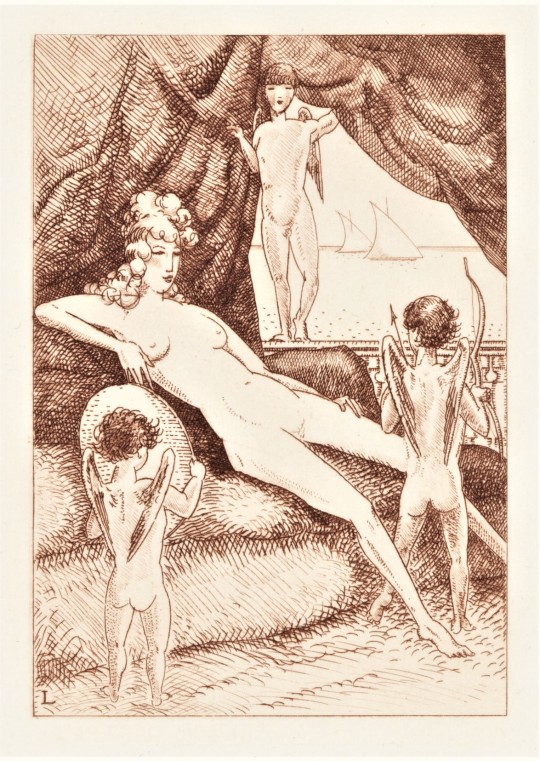







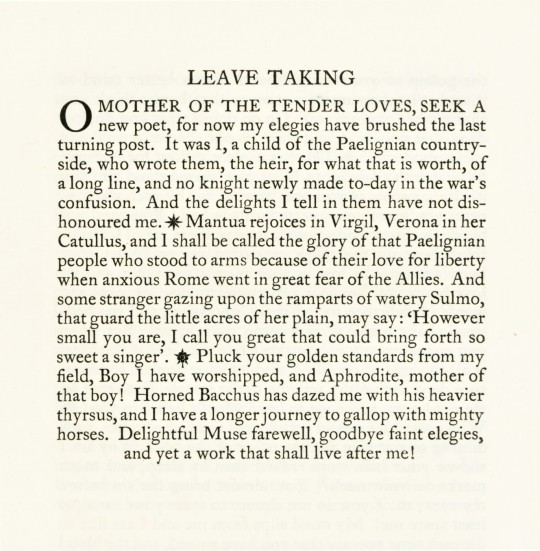
It’s Fine Press Friday!
For this Friday we offer the 1932 Golden Cockerel Press printing of The Amores of P. Ovidius Naso, translated by E. Powys Mathers, with five copperplate engravings by French artist, illustrator, and printmaker Jean Émile Laboureur, and printed in an edition of 350 copies by Robert Gibbings and his wife Moira Pennefather Gibbings.
Robert Gibbings was a prominent wood engraver who owned the Golden Cockerel Press from 1924 to 1933. The press was noted for its distinctive typography and ample use of wood-engraved illustrations. However, although Laboureur had come to Gibbings’s attention because of his wood engravings, Gibbings commissioned Laboureur solely as a copper engraver beginning in 1927. Laboureur would illustrate five titles for Gibbings; The Amores was his final effort for the press. Our copy is quarter-bound in maroon goatskin and green cloth by the notable London book binders Sangorski & Sutcliffe, and is another gift from our friend Jerry Buff.
View other posts with work by the Golden Cockerel Press.
View more Fine Press Friday posts.
#Fine Press Friday#Fine Press Fridays#fine press books#Golden Cockerel Press#Ovid#The Amores#Jean Émile Laboureur#J. E. Laboureur#E. Powys Mathers#Robert Gibbings#Moira Gibbings#Sangorski & Sutcliffe#engravings#copperplate engravings
33 notes
·
View notes
Text

Militiae species amor est.
(P. Ovidius Naso)
41 notes
·
View notes
Text


post, ut Roma potens opibus iam saecula quinque
vidit et edomito sustulit orbe caput
—
Then, when Rome, made mighty by vast riches,
By now She had seen five centuries and
Lifted Her head over Her conquered world
P. Ovidius Naso, Fastorum Libri Sex, Lib IV lines 255-256
#Rome#ovid#p ovidius naso#fasti#poetry#classics#classical studies#Ancient Mediterranean#Mythology#pagan gods#tagamemnon#fastorum Libri sex#rome personified#Ancient#roman goddess#Goddess#my translation#my art
123 notes
·
View notes
Text

Happy June!
- - -
protinus inflexo berecyntia tibia cornu
flabit et idaeae festa parentis erant
Let’s keep going: a foreign flute made of curving horn
will be played, and the Festival of the Trojan Mother will begin
— P. Ovidius Naso, Fastorum Libri Sex, lib. IV, 181-2
- - -
The Megalesia (The Festival of the Trojan/Idean Mother/Parent, i.e. the Phrygian goddess Magna Mater) was a Roman holiday that occurred every year from April 4th to 10th, consisting primarily of a musical and floral procession of the goddess’ image, religious plays performed both in theaters and on the steps of her temple, lavish, rotating dinner parties, and a final day culminating in a chariot race. The holiday was exclusively celebrated and viewed by the patrician (aristocratic) class — so much so that enslaved people were forbidden from viewing the procession and ordinary citizens were not permitted to participate in the rites and festivities.
April 4th is the anniversary of Magna Mater’s arrival in Rome. She was initially brought to the city in 204 BC after the Roman senate, concerned about Rome’s success in the midst of the Second Punic War (218-201 BC), consulted oracles and were informed that they needed to retrieve the “mother goddess.” Roman aristocrats painted themselves as the descendants of the Trojans, so they exported a mother goddess cult from Anatolia (modern-day central Turkey, a far cry from coastal Troy). However, this ended up being slightly more than the Roman elites had bargained for, because with the goddess came her castrated priests (castration was a major taboo during the Roman Republic) and their unusual rites, which included “foreign” music, (such as the aulos flute pictured above and leather drums) and begging for small change.
The aulos is a double reed wind instrument that produces a piercing tune, not unlike a bagless bagpipe. The aulos is deeply associated with the Greek world (or, more generally “the East”) and would have made the Megalesia procession sound suitably “foreign” for its imported god.
- - -
Interested in learning more?
Read Ovid’s Fasti, book IV. Lines 179-392.
Don’t read Latin? This is my preferred, published translation.
One definition of the Megalesia. And another.
As well as some information about Magna Mater. And her Roman sanctuary.
#aulos#flute#classics#classical studies#tagamemnon#p ovidius naso#ovid#megalesia#roman festival#rome#ancient Mediterranean#fasti#libri sex fastorum#my art#latin#greek
3 notes
·
View notes
Photo
ipsa crocos tenues liliaque alba legit, carpendi studio paulatim longius itur, et dominam casu nulla secuta comes.
P. Ovidius Naso, Fastorum Libri Sex, Lib. IV.442-444
"Persephone herself picked fine crocus and white lilies. Gathering her flowers with enthusiasm, she had been gradually walking further away, and by chance no attendants had followed their mistress."
translation by @zmaragdos
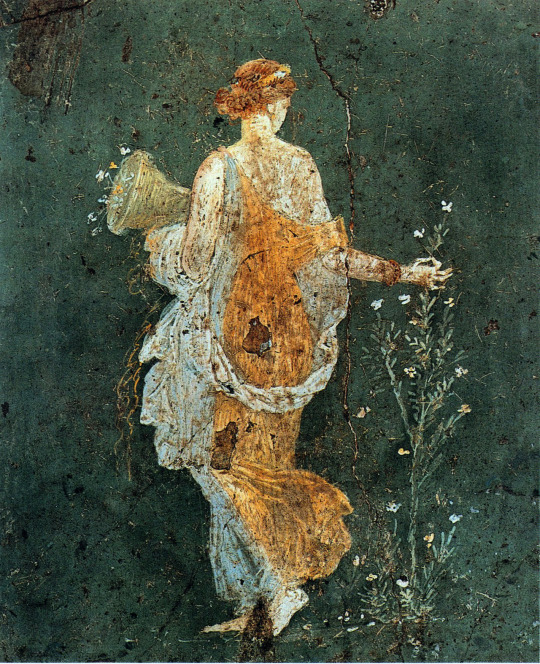
Unknown - Flora (woman picking flowers with a cornucopia), Roman wall painting from Pompeii, 1-45 AD.
#ovid#persephone#im reading too much into this pompeiian fresco#fasti iv#latin poetry#latin#latin elegy#tagamemnon#persephone wandering away from her entourage while collecting lily of the valley...
8K notes
·
View notes
Photo

“𝐃𝐨𝐥𝐨𝐫 𝐡𝐢𝐜 𝐭𝐢𝐛𝐢 𝐩𝐫𝐨𝐝𝐞𝐫𝐢𝐭 𝐨𝐥𝐢𝐦” - Publius Ovidius Naso BIÑAS, JOHN OVID A. 2019-00***-MN-0 Humanities and Social Sciences With High Honors Salamat sa dalawang taon PUP. Ito ay naging isa sa mga pinakamasayang parte ng aking highschool journey. Salamat din mama, papa, and family. Salamat HUMSS 2, sa aking mga nakilala at mga naging (̶k̶a̶s̶i̶n̶t̶a̶h̶a̶n̶)̶ kaibigan sa sintang paaralan. Mula sa’yo, para sa bayan. Padayon! Pagbati rin sa lahat ng aking mga kaibigan na nagsitapos! (at Polytechnic University of the Philippines (Official)) https://www.instagram.com/p/CTkFEQnpLce/?utm_medium=tumblr
0 notes